- Home
- Jack London
Northland Stories Page 14
Northland Stories Read online
Page 14
Hay Stockard lifted his head with a quick start. This was startling geographical information. The Hudson Bay post at Fort Yukon had other notions concerning the course of the river, believing it to flow into the Arctic.
“Then the Yukon empties into Bering Sea?” he asked.
“I do not know, but below there are Russians, many Russians. Which is neither here nor there. You may go on and see for yourself; you may go back to your brothers; but up the Koyukuk you shall not go while the priests and fighting men do my bidding. Thus do I command, I, Baptiste the Red, whose word is law and who am head man over this people.”
“And should I not go down to the Russians, or back to my brothers?”
“Then shall you go swift-footed before your god, which is a bad god, and the god of the white men.”
The red sun shot up above the northern skyline, dripping and bloody. Baptiste the Red came to his feet, nodded curtly, and went back to his camp amid the crimson shadows and the singing of the robins.
Hay Stockard finished his pipe by the fire, picturing in smoke and coal the unknown upper reaches of the Koyukuk, the strange stream which ended here its arctic travels and merged its waters with the muddy Yukon flood. Somewhere up there, if the dying words of a shipwrecked sailorman who had made the fearful overland journey were to be believed, and if the vial of golden grains in his pouch attested anything,—somewhere up there, in that home of winter, stood the Treasure House of the North. And as keeper of the gate, Baptiste the Red, English half-breed and renegade, barred the way.
“Bah!” He kicked the embers apart and rose to his full height, arms lazily outstretched, facing the flushing north with careless soul.
II
Hay Stockard swore, harshly, in the rugged monosyllables of his mother tongue. His wife lifted her gaze from the pots and pans, and followed his in a keen scrutiny of the river. She was a woman of the Teslin Country, wise in the ways of her husband’s vernacular when it grew intensive. From the slipping of a snowshoe thong to the forefront of sudden death, she could gauge occasion by the pitch and volume of his blasphemy. So she knew the present occasion merited attention. A long canoe, with paddles flashing back the rays of the westering sun, was crossing the current from above and urging in for the eddy. Hay Stockard watched it intently. Three men rose and dipped, rose and dipped, in rhythmical precision; but a red bandanna, wrapped about the head of one, caught and held his eye.
“Bill!” he called. “Oh, Bill!”
A shambling, loose-jointed giant rolled out of one of the tents, yawning and rubbing the sleep from his eyes. Then he sighted the strange canoe and was wide awake on the instant.
“By the jumping Methuselah! That damned sky-pilot!”
Hay Stockard nodded his head bitterly, half-reached for his rifle, then shrugged his shoulders.
“Pot-shot him,” Bill suggested, “and settle the thing out of hand. He ’ll spoil us sure if we don’t.” But the other declined this drastic measure and turned away, at the same time bidding the woman return to her work, and calling Bill back from the bank. The two Indians in the canoe moored it on the edge of the eddy, while its white occupant, conspicuous by his gorgeous head-gear, came up the bank.
“Like Paul of Tarsus, I give you greeting. Peace be unto you and grace before the Lord.”
His advances were met sullenly, and without speech.
“To you, Hay Stockard, blasphemer and Philistine, greeting. In your heart is the lust of Mammon, in your mind cunning devils, in your tent this woman whom you live with in adultery; yet of these divers sins, even here in the wilderness, I, Sturges Owen, apostle to the Lord, bid you to repent and cast from you your iniquities.”
“Save your cant! Save your cant!” Hay Stockard broke in testily. “You ’ll need all you ’ve got, and more, for Red Baptiste over yonder.”
He waved his hand toward the Indian camp, where the half-breed was looking steadily across, striving to make out the new-comers. Sturges Owen, disseminator of light and apostle to the Lord, stepped to the edge of the steep and commanded his men to bring up the camp outfit. Stockard followed him.
“Look here,” he demanded, plucking the missionary by the shoulder and twirling him about. “Do you value your hide?”
“My life is in the Lord’s keeping, and I do but work in His vineyard,” he replied solemnly.
“Oh, stow that! Are you looking for a job of martyrship?”
“If He so wills.”
“Well, you ’ll find it right here, but I ’m going to give you some advice first. Take it or leave it. If you stop here, you ’ll be cut off in the midst of your labors. And not you alone, but your men, Bill, my wife—”
“Who is a daughter of Belial and hearkeneth not to the true Gospel.”
“And myself. Not only do you bring trouble upon yourself, but upon us. I was frozen in with you last winter, as you will well recollect, and I know you for a good man and a fool. If you think it your duty to strive with the heathen, well and good; but do exercise some wit in the way you go about it. This man, Red Baptiste, is no Indian. He comes of our common stock, is as bull-necked as I ever dared be, and as wild a fanatic the one way as you are the other. When you two come together, hell ’ll be to pay, and I don’t care to be mixed up in it. Understand? So take my advice and go away. If you go down-stream, you ’ll fall in with the Russians. There ’s bound to be Greek priests among them, and they ’ll see you safe through to Bering Sea,—that ’s where the Yukon empties,—and from there it won’t be hard to get back to civilization. Take my word for it and get out of here as fast as God ’ll let you.”
“He who carries the Lord in his heart and the Gospel in his hand hath no fear of the machinations of man or devil,” the missionary answered stoutly. “I will see this man and wrestle with him. One backslider returned to the fold is a greater victory than a thousand heathen. He who is strong for evil can be as mighty for good, witness Saul when he journeyed up to Damascus to bring Christian captives to Jerusalem. And the voice of the Saviour came to him, crying, ‘Saul, Saul, why persecutest thou me?’ And therewith Paul arrayed himself on the side of the Lord, and thereafter was most mighty in the saving of souls. And even as thou, Paul of Tarsus, even so do I work in the vineyard of the Lord, bearing trials and tribulations, scoffs and sneers, stripes and punishments, for His dear sake.”
“Bring up the little bag with the tea and a kettle of water,” he called the next instant to his boatmen; “not forgetting the haunch of cariboo and the mixing-pan.”
When his men, converts by his own hand, had gained the bank, the trio fell to their knees, hands and backs burdened with camp equipage, and offered up thanks for their passage through the wilderness and their safe arrival. Hay Stockard looked upon the function with sneering disapproval, the romance and solemnity of it lost to his matter-of-fact soul. Baptiste the Red, still gazing across, recognized the familiar postures, and remembered the girl who had shared his star-roofed couch in the hills and forests, and the woman-child who lay somewhere by bleak Hudson’s Bay.
III
“Confound it, Baptiste, could n’t think of it. Not for a moment. Grant that this man is a fool and of small use in the nature of things, but still, you know, I can’t give him up.”
Hay Stockard paused, striving to put into speech the rude ethics of his heart.
“He ’s worried me, Baptiste, in the past and now, and caused me all manner of troubles; but can’t you see, he ’s my own breed—white—and—and—why, I could n’t buy my life with his, not if he was a nigger.”
“So be it,” Baptiste the Red made answer. “I have given you grace and choice. I shall come presently, with my priests and fighting men, and either shall I kill you, or you deny your god. Give up the priest to my pleasure, and you shall depart in peace. Otherwise your trail ends here. My people are against you to the babies. Even now have the children stolen away your canoes.” He pointed down to the river. Naked boys had slipped down the water from the point above, cast loose the canoes,
and by then had worked them into the current. When they had drifted out of rifle-shot they clambered over the sides and paddled ashore.
“Give me the priest, and you may have them back again. Come! Speak your mind, but without haste.”
Stockard shook his head. His glance dropped to the woman of the Teslin Country with his boy at her breast, and he would have wavered had he not lifted his eyes to the men before him.
“I am not afraid,” Sturges Owen spoke up. “The Lord bears me in his right hand, and alone am I ready to go into the camp of the unbeliever. It is not too late. Faith may move mountains. Even in the eleventh hour may I win his soul to the true righteousness.”
“Trip the beggar up and make him fast,” Bill whispered hoarsely in the ear of his leader, while the missionary kept the floor and wrestled with the heathen. “Make him hostage, and bore him if they get ugly.”
“No,” Stockard answered. “I gave him my word that he could speak with us unmolested. Rules of warfare, Bill; rules of warfare. He’s been on the square, given us warning, and all that, and—why, damn it, man, I can’t break my word!”
“He ’ll keep his, never fear.”
“Don’t doubt it, but I won’t let a half-breed outdo me in fair dealing. Why not do what he wants,—give him the missionary and be done with it?”
“N-no,” Bill hesitated doubtfully.
“Shoe pinches, eh?”
Bill flushed a little and dropped the discussion. Baptiste the Red was still waiting the final decision. Stockard went up to him.
“It ’s this way, Baptiste. I came to your village minded to go up the Koyukuk. I intended no wrong. My heart was clean of evil. It is still clean. Along comes this priest, as you call him. I did n’t bring him here. He ’d have come whether I was here or not. But now that he is here, being of my people, I ’ve got to stand by him. And I ’m going to. Further, it will be no child’s play. When you have done, your village will be silent and empty, your people wasted as after a famine. True, we will be gone; likewise the pick of your fighting men—”
“But those who remain shall be in peace, nor shall the word of strange gods and the tongues of strange priests be buzzing in their ears.”
Both men shrugged their shoulders and turned away, the half-breed going back to his own camp. The missionary called his two men to him, and they fell into prayer. Stockard and Bill attacked the few standing pines with their axes, felling them into convenient breastworks. The child had fallen asleep, so the woman placed it on a heap of furs and lent a hand in fortifying the camp. Three sides were thus defended, the steep declivity at the rear precluding attack from that direction. When these arrangements had been completed, the two men stalked into the open, clearing away, here and there, the scattered underbrush. From the opposing camp came the booming of war-drums and the voices of the priests stirring the people to anger.
“Worst of it is they ’ll come in rushes,” Bill complained as they walked back with shouldered axes.
“And wait till midnight, when the light gets dim for shooting.”
“Can’t start the ball a-rolling too early, then.” Bill exchanged the axe for a rifle, and took a careful rest. One of the medicine-men, towering above his tribesmen, stood out distinctly. Bill drew a bead on him.
“All ready?” he asked.
Stockard opened the ammunition box, placed the woman where she could reload in safety, and gave the word. The medicine-man dropped. For a moment there was silence, then a wild howl went up and a flight of bone arrows fell short.
“I ’d like to take a look at the beggar,” Bill remarked, throwing a fresh shell into place. “I ’ll swear I drilled him clean between the eyes.”
“Did n’t work.” Stockard shook his head gloomily. Baptiste had evidently quelled the more warlike of his followers, and instead of precipitating an attack in the bright light of day, the shot had caused a hasty exodus, the Indians drawing out of the village beyond the zone of fire.
In the full tide of his proselyting fervor, borne along by the hand of God, Sturges Owen would have ventured alone into the camp of the unbeliever, equally prepared for miracle or martyrdom; but in the waiting which ensued, the fever of conviction died away gradually, as the natural man asserted itself. Physical fear replaced spiritual hope; the love of life, the love of God. It was no new experience. He could feel his weakness coming on, and knew it of old time. He had struggled against it and been overcome by it before. He remembered when the other men had driven their paddles like mad in the van of a roaring ice-flood, how, at the critical moment, in a panic of worldly terror, he had dropped his paddle and besought wildly with his God for pity. And there were other times. The recollection was not pleasant. It brought shame to him that his spirit should be so weak and his flesh so strong. But the love of life! the love of life! He could not strip it from him. Because of it had his dim ancestors perpetuated their line; because of it was he destined to perpetuate his. His courage, if courage it might be called, was bred of fanaticism. The courage of Stockard and Bill was the adherence to deep-rooted ideals. Not that the love of life was less, but the love of race tradition more; not that they were unafraid to die, but that they were brave enough not to live at the price of shame.
The missionary rose, for the moment swayed by the mood of sacrifice. He half crawled over the barricade to proceed to the other camp, but sank back, a trembling mass, wailing: “As the spirit moves! As the spirit moves! Who am I that I should set aside the judgments of God? Before the foundations of the world were all things written in the book of life. Worm that I am, shall I erase the page or any portion thereof? As God wills, so shall the spirit move!”
Bill reached over, plucked him to his feet, and shook him, fiercely, silently. Then he dropped the bundle of quivering nerves and turned his attention to the two converts. But they showed little fright and a cheerful alacrity in preparing for the coming passage at arms.
Stockard, who had been talking in undertones with the Teslin woman, now turned to the missionary.
“Fetch him over here,” he commanded of Bill.
“Now,” he ordered, when Sturges Owen had been duly deposited before him, “make us man and wife, and be lively about it.” Then he added apologetically to Bill: “No telling how it ’s to end, so I just thought I ’d get my affairs straightened up.”
The woman obeyed the behest of her white lord. To her the ceremony was meaningless. By her lights she was his wife, and had been from the day they first foregathered. The converts served as witnesses. Bill stood over the missionary, prompting him when he stumbled. Stockard put the responses in the woman’s mouth, and when the time came, for want of better, ringed her finger with thumb and forefinger of his own.
“Kiss the bride!” Bill thundered, and Sturges Owen was too weak to disobey.
“Now baptize the child!”
“Neat and tidy,” Bill commented.
“Gathering the proper outfit for a new trail,” the father explained, taking the boy from the mother’s arms. “I was grub-staked, once, into the Cascades, and had everything in the kit except salt. Never shall forget it. And if the woman and the kid cross the divide to-night they might as well be prepared for pot-luck. A long shot, Bill, between ourselves, but nothing lost if it misses.”
A cup of water served the purpose, and the child was laid away in a secure corner of the barricade. The men built the fire, and the evening meal was cooked.
The sun hurried round to the north, sinking closer to the horizon. The heavens in that quarter grew red and bloody. The shadows lengthened, the light dimmed, and in the sombre recesses of the forest life slowly died away. Even the wild fowl in the river softened their raucous chatter and feigned the nightly farce of going to bed. Only the tribesmen increased their clamor, war-drums booming and voices raised in savage folk songs. But as the sun dipped they ceased their tumult. The rounded hush of midnight was complete. Stockard rose to his knees and peered over the logs. Once the child wailed in pain and disconcerted him. The mother be
nt over it, but it slept again. The silence was interminable, profound. Then, of a sudden, the robins burst into full-throated song. The night had passed.
A flood of dark figures boiled across the open. Arrows whistled and bow-thongs sang. The shrill-tongued rifles answered back. A spear, and a mighty cast, transfixed the Teslin woman as she hovered above the child. A spent arrow, diving between the logs, lodged in the missionary’s arm.
There was no stopping the rush. The middle distance was cumbered with bodies, but the rest surged on, breaking against and over the barricade like an ocean wave. Sturges Owen fled to the tent, while the men were swept from their feet, buried beneath the human tide. Hay Stockard alone regained the surface, flinging the tribesmen aside like yelping curs. He had managed to seize an axe. A dark hand grasped the child by a naked foot, and drew it from beneath its mother. At arm’s length its puny body circled through the air, dashing to death against the logs. Stockard clove the man to the chin and fell to clearing space. The ring of savage faces closed in, raining upon him spear-thrusts and bone-barbed arrows. The sun shot up, and they swayed back and forth in the crimson shadows. Twice, with his axe blocked by too deep a blow, they rushed him; but each time he flung them clear. They fell underfoot and he trampled dead and dying, the way slippery with blood. And still the day brightened and the robins sang. Then they drew back from him in awe, and he leaned breathless upon his axe.
“Blood of my soul!” cried Baptiste the Red. “But thou art a man. Deny thy god, and thou shalt yet live.”
Stockard swore his refusal, feebly but with grace.
“Behold! A woman!” Sturges Owen had been brought before the half-breed.
Beyond a scratch on the arm, he was uninjured, but his eyes roved about him in an ecstasy of fear. The heroic figure of the blasphemer, bristling with wounds and arrows, leaning defiantly upon his axe, indifferent, indomitable, superb, caught his wavering vision. And he felt a great envy of the man who could go down serenely to the dark gates of death. Surely Christ, and not he, Sturges Owen, had been moulded in such manner. And why not he? He felt dimly the curse of ancestry, the feebleness of spirit which had come down to him out of the past, and he felt an anger at the creative force, symbolize it as he would, which had formed him, its servant, so weakly. For even a stronger man, this anger and the stress of circumstance were sufficient to breed apostasy, and for Sturges Owen it was inevitable. In the fear of man’s anger he would dare the wrath of God. He had been raised up to serve the Lord only that he might be cast down. He had been given faith without the strength of faith; he had been given spirit without the power of spirit. It was unjust.

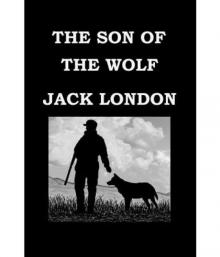 The Son of the Wolf
The Son of the Wolf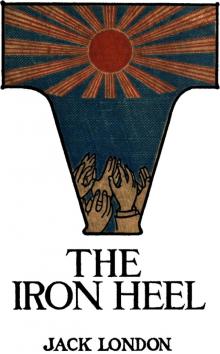 The Iron Heel
The Iron Heel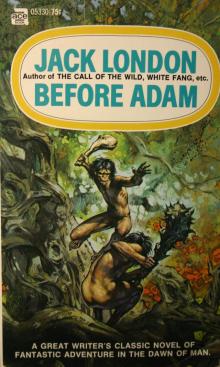 Before Adam
Before Adam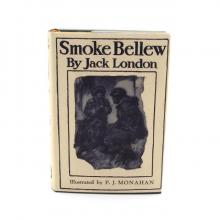 Smoke Bellew
Smoke Bellew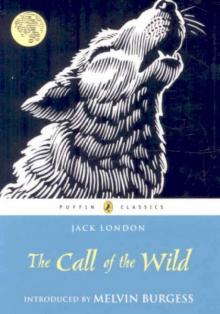 The Call of the Wild
The Call of the Wild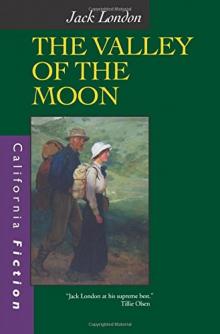 The Valley of the Moon Jack London
The Valley of the Moon Jack London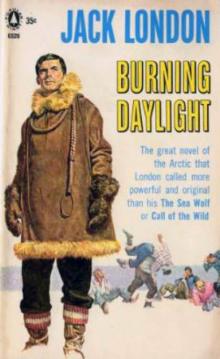 Burning Daylight
Burning Daylight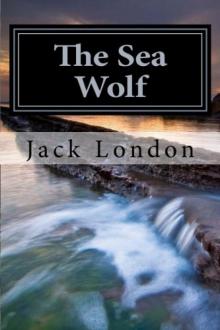 The Sea Wolf
The Sea Wolf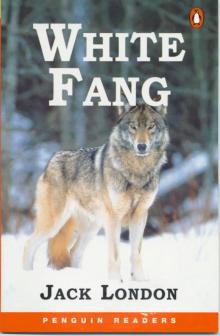 White Fang
White Fang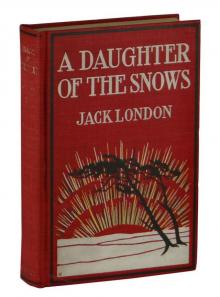 A Daughter of the Snows
A Daughter of the Snows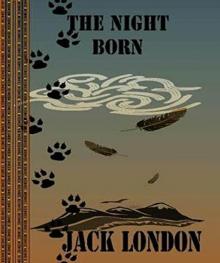 The Night-Born
The Night-Born A Son Of The Sun
A Son Of The Sun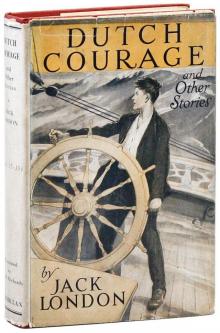 Dutch Courage and Other Stories
Dutch Courage and Other Stories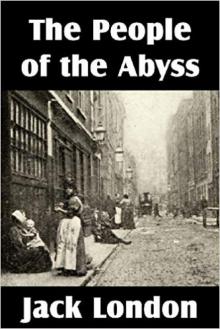 The People of the Abyss
The People of the Abyss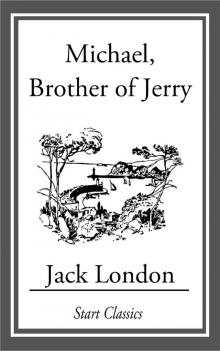 Michael, Brother of Jerry
Michael, Brother of Jerry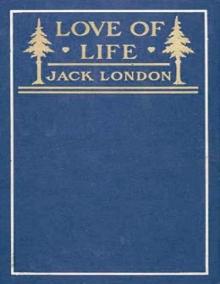 Love of Life, and Other Stories
Love of Life, and Other Stories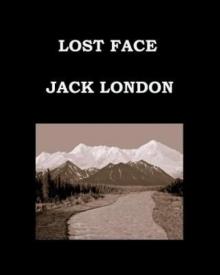 Lost Face
Lost Face The Road
The Road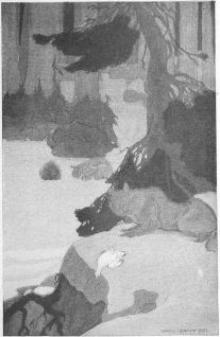 Love of Life
Love of Life The Turtles of Tasman
The Turtles of Tasman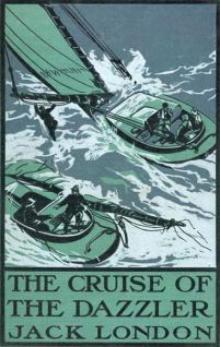 The Cruise of The Dazzler
The Cruise of The Dazzler The Heathen
The Heathen The Scab
The Scab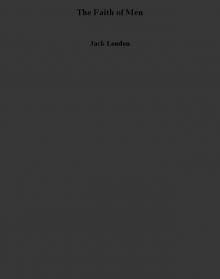 The Faith of Men
The Faith of Men Adventure
Adventure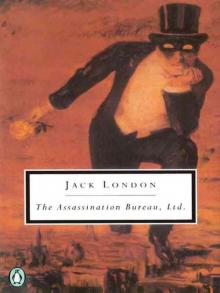 The Assassination Bureau, Ltd.
The Assassination Bureau, Ltd.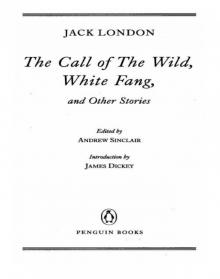 The Call of the Wild, White Fang, and Other Stories
The Call of the Wild, White Fang, and Other Stories The Call of the Wild and Selected Stories
The Call of the Wild and Selected Stories Jerry of the Islands
Jerry of the Islands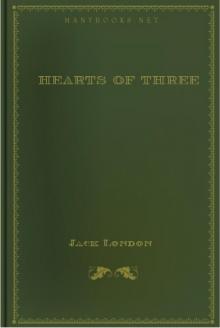 Hearts of Three
Hearts of Three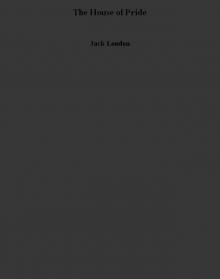 The House of Pride
The House of Pride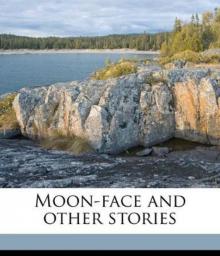 Moon-Face and Other Stories
Moon-Face and Other Stories Children of the Frost
Children of the Frost South Sea Tales
South Sea Tales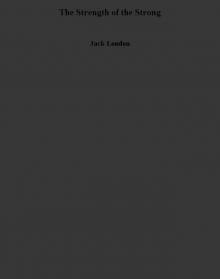 The Strength of the Strong
The Strength of the Strong The Jacket (The Star-Rover)
The Jacket (The Star-Rover) The Little Lady of the Big House
The Little Lady of the Big House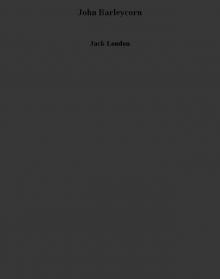 John Barleycorn
John Barleycorn ADaugter of Snows
ADaugter of Snows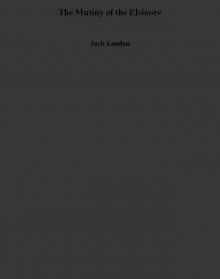 The Mutiny of the Elsinore
The Mutiny of the Elsinore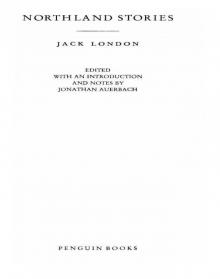 Northland Stories
Northland Stories Tales of the Fish Patrol
Tales of the Fish Patrol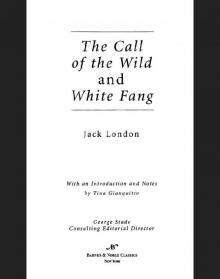 Call of the Wild and White Fang (Barnes & Noble Classics Series)
Call of the Wild and White Fang (Barnes & Noble Classics Series)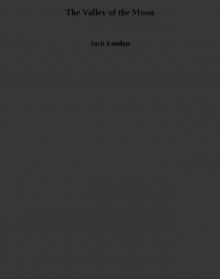 The Valley of the Moon
The Valley of the Moon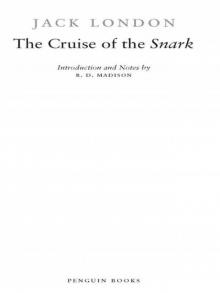 The Cruise of the Snark
The Cruise of the Snark The Game
The Game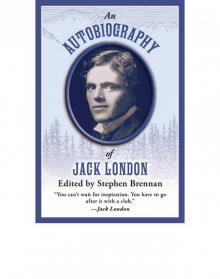 An Autobiography of Jack London
An Autobiography of Jack London